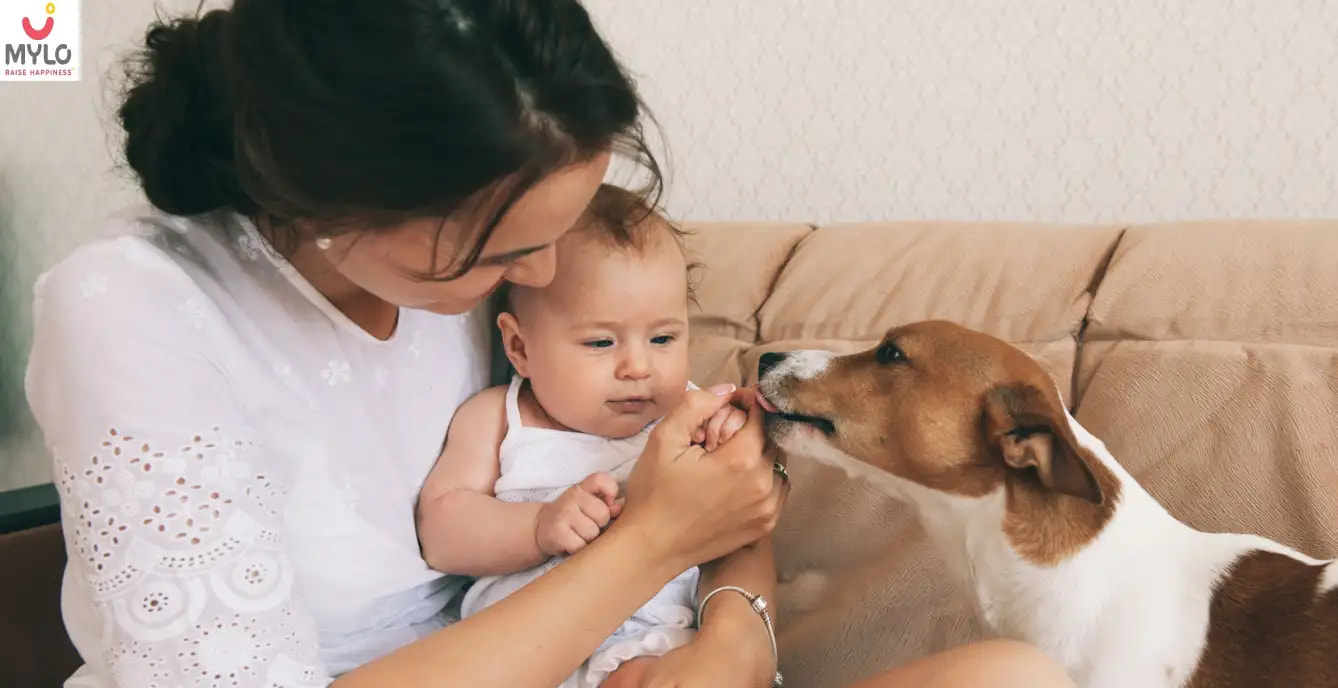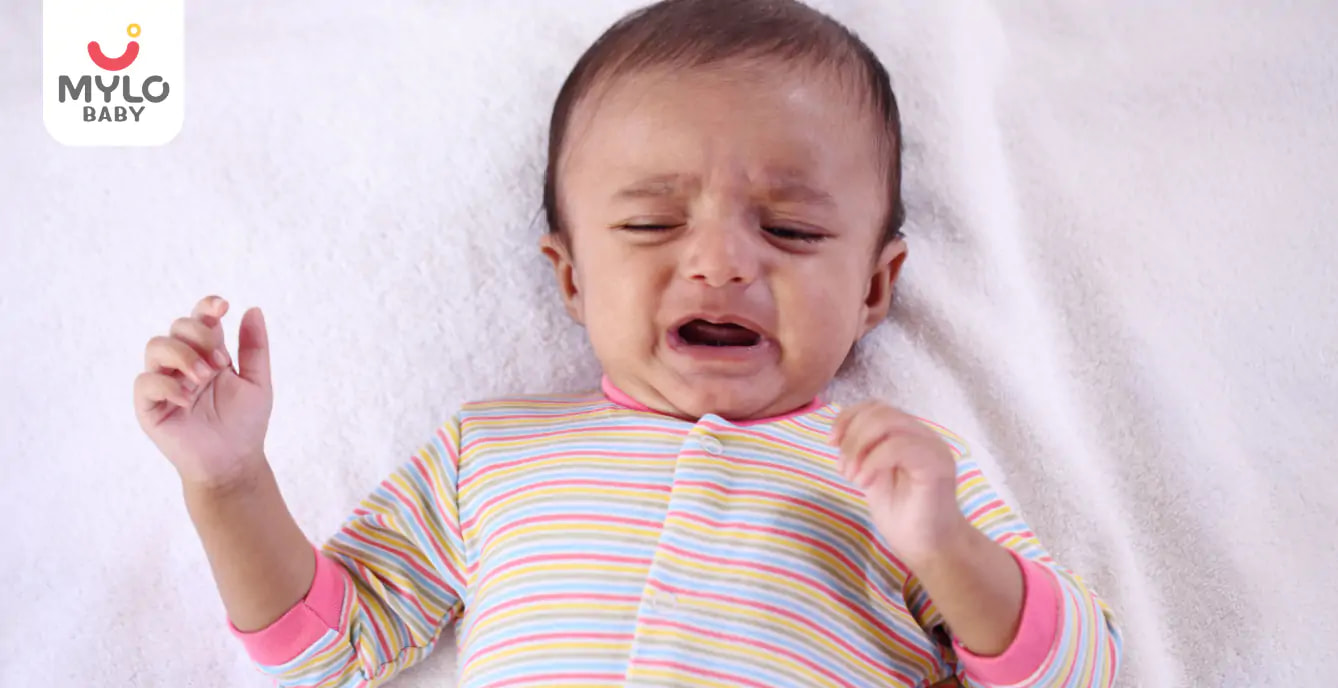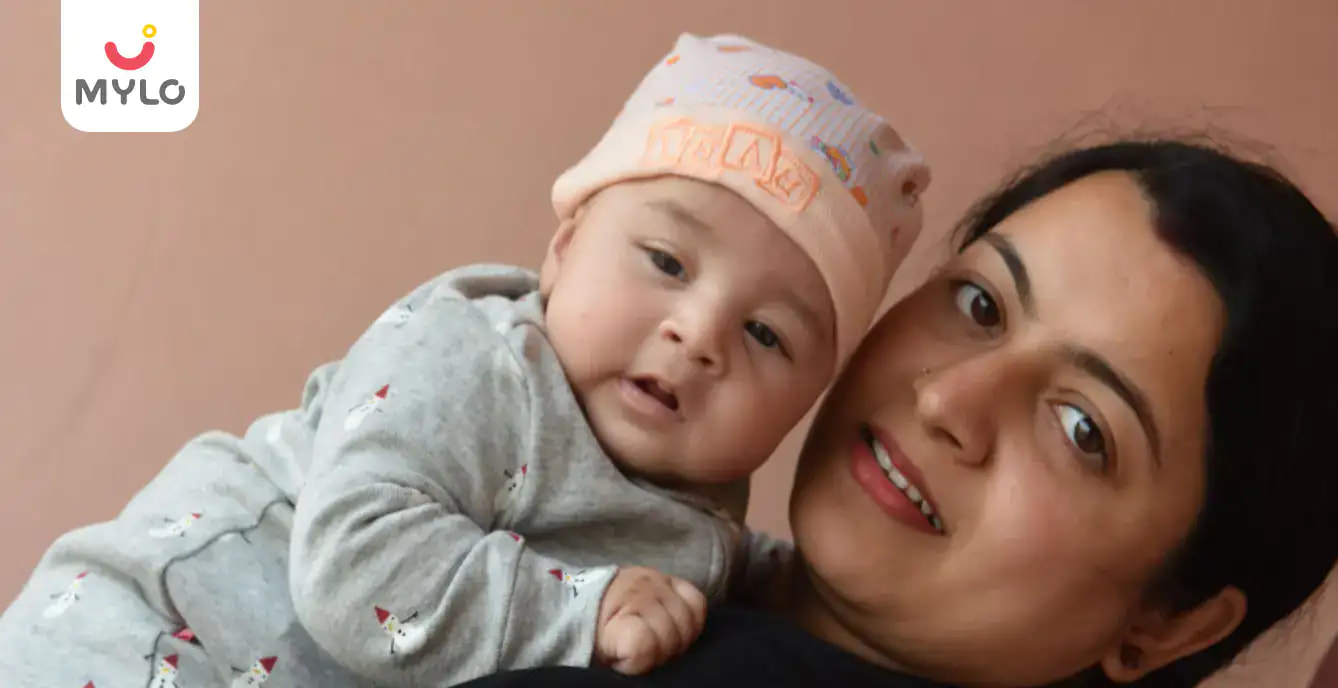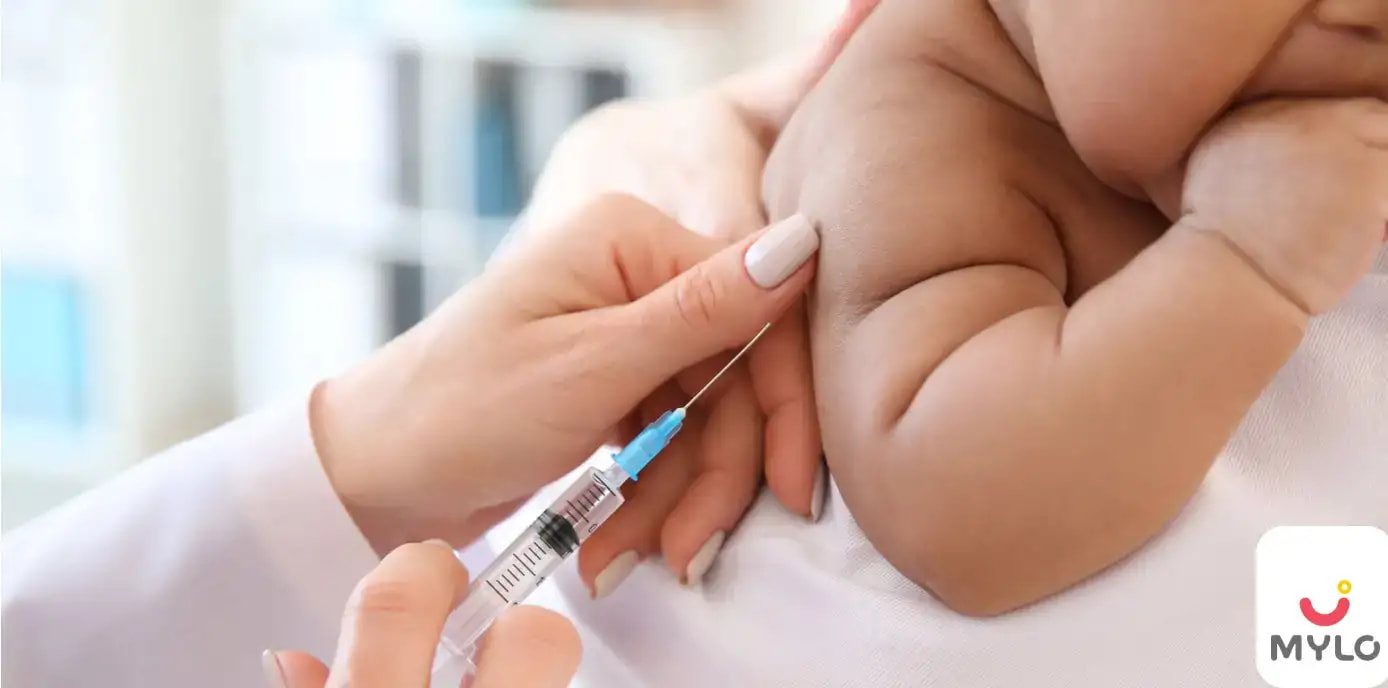Home

Pets for Baby: Safety, Precautions & More
In this Article

Baby Care
Pets for Baby: Safety, Precautions & More
Updated on 3 November 2023
Many people's first experience with parenting was with their pets. It's only natural to worry about how your pet will respond to adding a human baby to the family. As with any other task, patience and perseverance go a long way. If you put in the time and effort before the baby comes, everyone in the house, including the family pet, will be able to adjust to life with a crying infant.
Your relationship with your pet is unique. You're familiar with their usual routines, how they react to being petted, and how they get along with other animals, but can you predict how they'll react to a new human in the house? Pets are highly perceptive and will notice the many changes after a new baby arrives. Babies aren't always gentle, especially as they get older and learn to grasp and pull.
Are Pets Safe For Babies?
As a parent, you should know that having pets for kids can help in many ways. Having a pet in the home might benefit a child's emotional and social growth. However, pets might be dangerous to your kid's health and well-being.
Your pet poses a risk to your child regardless of how well you think you know them or how docile they appear. Maintaining your child's physical and emotional well-being should be your priority. Both your kid and the family pet will benefit from your efforts to keep them safe.
What Is A Good First Pet For A Child?
A child's first pet is a beautiful adventure and a challenging responsibility. Most kids are smitten with animals, making getting them a pet tempting. Remember that most kids have never had to take charge of something as demanding as a live pet before, so despite their assurances that they'll give it regular attention, like feeding and grooming, they might not follow through. This is why choosing the right pet when you have a young child in the house is crucial. Some pets that fit this category are listed below.
Dogs
Dogs need lots of attention, and training them may be time-consuming and taxing. Because of this, a dog is not an ideal pet for a child's first responsibility. Nonetheless, dogs are very loving and may be excellent, protective playmates for kids with the right amount of adult supervision and care.
Hamsters, Gerbils, And Guinea Pigs
Many people advise going with more modest first pets for baby. Young children benefit from having small pets like guinea pigs, hamsters, and gerbils as friends since they are safe, manageable, and simple to care for.
Cats
Cats are great pets since they don't require much work from their owners. Cats may be left alone for long periods if necessary, and an adult cat is unlikely to be hurt by a child. A first-time cat owner who is older and more mature would be ideal. In simpler words, cats are low maintenance pets for kids.
Fish
As pets, fish are fantastic for kids since they engage without being too demanding. Don't worry about your baby hurting his pet fish so long as the aquarium is placed in a safe, secure spot where it can't be moved or tampered with.
What Precautions Should You Take With Pets Around Babies?
Even long-term household pets might spring a surprise at any moment. Keep a watchful eye on the baby and the pet at all times because the baby is sure to make sudden movements and even resort to disobedient behavior when they reach developmental milestones. In order to avoid potential dangers, keep in mind the following:
-
If you need to run out of the room for a moment to grab a diaper or bottle, take the baby or the pet with you.
-
Young children should be kept away from pet food and medication.
-
If your pets have free garden reign, check for faeces and remove them before letting your kid play there.
-
Never leave your infant unattended on the floor if pets like dogs and cats are in the house.
-
Check whether your infant can squeeze through the dog or cat flap in the rear entrance. Babies have been known to escape through these cracks on numerous occasions.
-
If your pet becomes hostile or aggressive toward the infant, you must address the situation quickly.
-
To ensure your infant's safety, consult a professional immediately if you notice any unusual behavior from your dog.
-
Baby swings are significant for naps and playing, but keep an eye out for pets if you have any. They may exhibit disruptive behavior if agitated by moving things.
-
These are just a few helpful hints for facilitating a harmonious coexistence between family pets and infants. Your baby's and your pet's compatibility will ultimately depend on their personalities.
-
To be safe, wait until your kid is seven years old before leaving them alone with the family pet.
How To Keep Children Healthy Around Pets?
If you are concerned about pets and babies health when they are in the same house, do not worry. Below mentioned points will make things simpler for you:
-
After contact with animals, their waste, food, or supplies, you and your child must wash your hands thoroughly. This is essential before dealing with a baby or baby items such as afiers.
-
Think carefully about which pets might fit in best with your family. Read up on the topic beforehand before bringing home a new pet.
-
No one should come into contact with rodents, reptiles, amphibians, or fowl, especially young children, the elderly, or those with compromised immune systems.
-
Avoid getting too near to animals like mice, reptiles, amphibians, and chickens by kissing, cuddling, or holding them. These animals are more likely to spread infection.
-
Kids and animals need constant supervision. Stop kids from kissing their dogs or letting them get too close to their faces so their pets can lick their lips or tongue.
-
Animals and their supplies should not be near where food is handled, cooked, or eaten.
-
Be sure to pick up after your pet if it has an accident.
-
You should scoop the litter box daily (more often if anyone living there is expecting a child) and change the litter at least twice a week. Women who are pregnant should not scoop cat litter.
-
You should always pick up dog poop when it has been left somewhere.
-
When feasible, take habitats, cages, and supplies outside to clean them so as not to spread germs within the house. However, if that is not an option, you should disinfect the laundry sink or bathtub you use to clean them.
-
To avoid getting bitten or scratched, avoid roughhousing with animals. Animal-safe play is something that children should be taught early on. Young children should be kept away from eating pets.
-
If you've been bitten or scratched by an animal, wash the wound well with soap and water right away. Consult a doctor if the injury seems serious, the wound gets red, painful, warm, or swollen, the animal seems sick, or you don't know the animal's immunization status.
-
Protect yourself and your loved ones by keeping a safe distance when viewing wildlife.
Conclusion
Pets for baby is a pretty subjective topic and the views of each person may vary. However, in the bright light and when supervised thoroughly, pets can teach kids empathy, kindness and unconditional love



Written by
Khushboo Jain
Get baby's diet chart, and growth tips

Related Articles
Related Questions
Influenza and boostrix injection kisiko laga hai kya 8 month pregnancy me and q lagta hai ye plz reply me

Hai.... My last period was in feb 24. I tested in 40 th day morning 3:30 .. That is faint line .. I conculed mylo thz app also.... And I asked tha dr wait for 3 to 5 days ... Im also waiting ... Then I test today 4:15 test is sooooo faint ... And I feel in ma body no pregnancy symptoms. What can I do .

Baby kicks KB Marta hai Plz tell mi

PCOD kya hota hai

How to detect pcos

Related Topics
RECENTLY PUBLISHED ARTICLES
our most recent articles

Diet & Nutrition
গর্ভাবস্থায় আলুবোখরা: উপকারিতা ও ঝুঁকি | Prunes During Pregnancy: Benefits & Risks in Bengali

Diet & Nutrition
গর্ভাবস্থায় হিং | ঝুঁকি, সুবিধা এবং অন্যান্য চিকিৎসা | Hing During Pregnancy | Risks, Benefits & Other Treatments in Bengali

Women Specific Issues
স্তনের উপর সাদা দাগ: লক্ষণ, কারণ এবং চিকিৎসা | White Spots on Nipple: Causes, Symptoms, and Treatments in Bengali

Diet & Nutrition
গর্ভাবস্থায় পোহা: উপকারিতা, ধরণ এবং রেসিপি | Poha During Pregnancy: Benefits, Types & Recipes in Bengali

Diet & Nutrition
গর্ভাবস্থায় মাছ: উপকারিতা এবং ঝুঁকি | Fish In Pregnancy: Benefits and Risks in Bengali

Diet & Nutrition
গর্ভাবস্থায় রেড ওয়াইন: পার্শ্ব প্রতিক্রিয়া এবং নির্দেশিকা | Red Wine During Pregnancy: Side Effects & Guidelines in Bengali
- ইনার থাই চ্যাফিং: কারণ, উপসর্গ এবং চিকিৎসা | Inner Thigh Chafing: Causes, Symptoms & Treatment in Bengali
- গর্ভাবস্থায় ব্রাউন রাইস: উপকারিতা ও সতর্কতা | Brown Rice During Pregnancy: Benefits & Precautions in Bengali
- Velamentous Cord Insertion - Precautions, Results & Safety
- Unlock the Secret to Flawless Skin: 7 Must-Have Qualities in a Face Serum
- Unlock the Secret to Radiant Skin: How Vitamin C Serum Can Transform Your Complexion
- Gender No Bar: 10 Reasons Why Everyone Needs a Body Lotion
- Unlock the Secret to Radiant Skin How to Choose the Perfect Body Lotion for Your Skin Type
- Top 10 Reasons to Apply a Body Lotion After Every Bath
- Communication in Toddlers: Milestones & Activities
- How to Improve Vocabulary for Toddlers?
- A Comprehensive Guide to Understanding Placenta Accreta
- Vulvovaginitis in Toddlers Causes, Symptoms and Treatment
- A Comprehensive Guide to Understanding Cerebral Palsy in Children
- Bitter Taste in Mouth During Pregnancy: Understanding the Causes and Remedies


AWARDS AND RECOGNITION

Mylo wins Forbes D2C Disruptor award

Mylo wins The Economic Times Promising Brands 2022
AS SEEN IN

- Mylo Care: Effective and science-backed personal care and wellness solutions for a joyful you.
- Mylo Baby: Science-backed, gentle and effective personal care & hygiene range for your little one.
- Mylo Community: Trusted and empathetic community of 10mn+ parents and experts.
Product Categories
Baby Carrier | Baby Soap | Baby Wipes | Stretch Marks Cream | Baby Cream | Baby Shampoo | Baby Massage Oil | Baby Hair Oil | Stretch Marks Oil | Baby Body Wash | Baby Powder | Baby Lotion | Diaper Rash Cream | Newborn Diapers | Teether | Baby Kajal | Baby Diapers Pants | Cloth Diapers | Laundry Detergent | Lactation Granules |








